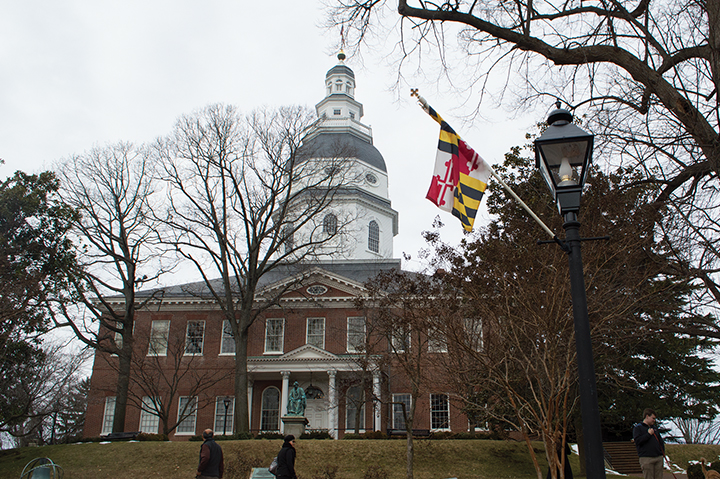
Maryland State House
This year’s legislature emphasized higher education, pouring billions of dollars into it, retaining a cap on University System of Maryland tuition hikes and increasing funds for this university’s capital projects.
The university system also secured two big victories with two unanimously passed bills. One aimed to bring the business community closer to the university through zoning incentives, and the other created a state grant program that aims to attract top university faculty.
But several bills that could have had major impacts on state higher education didn’t make it as far this year, either drawing unfavorable reports by committees or failing to reach committee at all.
SEXUAL ASSAULT SURVEYS AND SEXUAL ASSAULT VICTIM ADVOCATES
One failed bill was designed to address the problem of sexual assaults going unreported on college campuses. The proposed legislation garnered support from student leaders but died in the committee process.
In the House of Delegates, Del. Jon Cardin (D-Baltimore County) introduced the bill, which would require state colleges to administer sexual assault surveys every three years to students, faculty members and employees.
The state Higher Education Commission would have developed the surveys with consultation from the state’s health and mental hygiene department and the governor’s crime control and prevention office.
Cardin said at a House Ways and Means committee hearing in January that the bill’s provisions would make for a safer environment on college campuses. He cited Department of Justice statistics that showed one in five women are sexually assaulted in college and 95 percent of sexual assaults go unreported.
“Just those two facts alone should give us pause as to what we can do,” Cardin said at the committee meeting.
However, some university system officials described the bill system officials described the bill as an ineffective, unfunded mandate, The Diamondback reported in January, because it would do little to combat the problem.
“It was pretty disheartening for me, as a student advocate here, to see them advocate against anything that would help reduce sexual violence on campus,” said Samantha Zwerling, this university’s Student Government Association president. “I think the schools are worried about another requirement, another survey that they are going to have to administer.”
PAY IT FORWARD PILOT PROGRAM
Looking for new ways to make college affordable, several legislators took on an initiative that would radically alter the way students pay for college.
A Pay It Forward model would allow students to enroll at a state college with no up-front costs and pay back their tuition through small deductions from their income over the course of their post-graduate working life.
This bill would not have implemented the system outright but would have instead commissioned studies and tasked the university system with determining the feasibility of implementing such a program. Had the bill passed, the state would have joined New York, Oregon and Washington state in considering this move.
“There’s a lot of questions to work out, but the concept is really something that’s beginning to take hold,” said Del. Kirill Reznik (D-Montgomery), a co-sponsor of the bill, in a February interview with The Diamondback.
The up-front costs of the program, however, worried university system officials. P.J. Hogan, the university system’s government relations vice chancellor, said in a February interview that the first cohort of students taking advantage of this system would deprive the university system of needed tuition revenue.
SMOKE-FREE AND TOBACCO-FREE CAMPUS FUNDING
A bill aimed at making smoke-free campuses pay the tab for lost tobacco revenue as the result of their policies didn’t gain much traction this year.
The bill, sponsored by Del. John Wood (D-Charles and St. Mary’s), would reduce state funding to smoke-free colleges by an amount proportionate to the percentage of the state’s total revenue earned from the tobacco tax. It was supported by the tobacco lobby but strongly opposed by the higher education lobby.
This university implemented a smoking ban on the campus, with the exception of four designated smoking areas, in July to comply with university system regulations.
Tobacco lobbyist Bruce Bereano said in a March hearing with the House Appropriations Committee that by banning smoking on the campus, students are encouraged to spend less on tobacco products, thus affecting a revenue stream that makes nearly 3 percent of the state’s total revenue.
“It’s logical, it’s consistent, it’s honest,” Bereano said.
The university system did not support the bill, and Hogan said in a March interview that it’s hard to determine how much of the state’s total revenue actually comes from the tobacco tax and goes to the system’s coffers because the dollars “don’t have little serial numbers on them.”
MILITARY RESIDENTS AND NON-RESIDENT TUITION EXEMPTION
Current state law grants in-state tuition rates to active military stationed in the state and to their children. A bill aimed at extending the provision to children of retired military personnel did not make it out of committee.
Sponsored by Sen. Nancy Jacobs (R-Harford and Cecil), the bill would give the children of retired military members in-state tuition if they attended a state school in the four years prior to enrolling in a state college.
Jacobs said military children, often colloquially referred to as “military brats,” are forced to move and change schools often as they grow up, leaving their ability to attend a state college anywhere in question.
Questions remained about the legislation’s impact on the university system’s finances, as officials did not know how many people would take advantage of the program. With each individual who takes advantage of this bill, tuition revenue could drop by $10,700, according to a state analysis of the bill.



